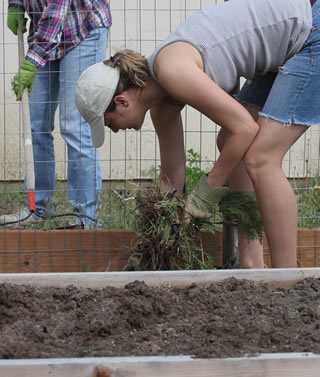PHAP@Work—Hannah Silveus

Hannah Silveus
PHAP Class of 2012 Alumnus
PHAP Host Site
Yellowstone City-County Health Department/
RiverStone Health
Billings, Montana
Program Areas
First Year: Chronic Disease/Population Health Services
Second Year: Maternal
and Child Health
How Hannah helped improve the retention rate of WIC clients in Yellowstone County, Montana
PUBLIC HEALTH CONCERN: Despite studies that link the USDA’s Special Supplemental Nutrition Program for Women, Infants, and Children (WIC) with improved maternal and infant health outcomes, only about 80% of eligible participants nationwide enroll in the program.
In Yellowstone County, Montana, those numbers were much lower. In 2012, 8,927 residents of the county were eligible for WIC program benefits. Of those residents eligible for benefits, only 3,313 enrolled in WIC and only 2,913 participated actively (i.e., attended appointments and received WIC benefits). Many WIC enrollees did not pick up their food coupons regularly, which led to automatic termination of benefits. So, a quality improvement (QI) project was proposed to determine why participation was so low.
The project’s overall goal was to increase the percentage of children ages 1–5 years whose parents were participating actively in WIC.
ACTION TAKEN: Hannah received a grant through the National Network for Public Health Institutes (NNPHI) to conduct a QI project to increase the number of current WIC clients who participated actively in the program. She established a multidisciplinary QI team that included a past WIC participant, WIC nutrition educators, the WIC director, and the state health department’s WIC program specialist. The group met regularly over a nine-month period and, using a plan-do-study-act approach, conducted group exercises like brainstorming, creating process flow charts, and group prioritizing. They also surveyed past and current WIC families to gather data on program participation needs and barriers.
Drawing from Hannah’s preliminary research, the team identified the root cause of nonparticipation: Clients weren’t being asked to schedule their next appointment before leaving the office. Of those who had been terminated from WIC, 68% did not have their next appointment scheduled. This prompted Hannah and the QI team to shift the project focus, and they began testing a process change that required clients to schedule their next appointment before leaving the office.
RESULTS: By the end of the methodical plan-do-study-act cycle, the percentage of WIC clients being scheduled had increased from 56% to 97%, and the number of clients each month whose benefits were terminated decreased from 45% to 36%. By standardizing the scheduling process, participation increased and WIC staff found additional time and resources to spend on other ways to increase participation, such as sending cell phone reminders.
SHARING THE RESULTS: Hannah published her findings on the public health quality improvement exchange (phqix.org), joined a regional NNPHI webinar to share the project’s successes, and presented at national Open Forums for QI in Public Health in Milwaukee and Memphis.
PHAP in the Field: Hannah Silveus

Hannah getting hands-on public health experience in the WIC community garden.
During her tenure with PHAP, Hannah Silveus worked on a variety of initiatives in population health, quality improvement, health equity, and nutrition education at RiverStone Health in Billings, Montana.
“As a professional just beginning her public health career, Hannah has had a wide sampling of public health interventions and training opportunities,” says her host site supervisor, Shawn Hinz, vice president, Public Health Services at RiverStone Health.
“If you’re flexible, you’ll be richly rewarded,” says Hannah. “From dropping everything to move across the country to a state I’d never set foot in before, to saying ‘yes’ to projects I didn’t have an ounce of experience with, I’ve learned that public health is a dynamic field.”
“Placing newly graduated PHAP associates in STLT agencies is a great way to help them gain knowledge of public health systems and develop skills in frontline public health practice,” says Hannah’s CDC supervisor, Denise Freeman, public health advisor. “Many tasks performed by PHAP associates are duties that, for various reasons, might not get completed readily without their help and contribute greatly to meeting local agencies’ goals.”
In addition to her WIC program activities, below are a few examples of Hannah’s other accomplishments in
Yellowstone County.
Year 1: Chronic Disease/Population Health Services
- Designed and managed a county-wide road safety campaign to reduce pedestrian and bicyclist injuries from collisions with motorists. The campaign received three gold “Montana ADDY” communication awards.
- Coordinated community health events, like Native American Pink Ribbon Breast Cancer Awareness Bingo Night, for which she solicited donors and recruited volunteers.
Year 2: Maternal and Child Health
- Served as market manager for a grassroots farmers market, spearheaded by the local Healthy by Design coalition, to bring fresh produce to an urban neighborhood classified as a “food desert.” The average number of weekly customers increased from 148 in 2013 to 200 in 2014, and sales increased from $592 to $728 per week.
- Wrote the WIC community garden program curriculum and received several grants to expand the garden and add a sustainable watering system.
“I was impressed with the skills Hannah brought to the position and her ability to complete assignments quickly with minor supervision,” says Denise. “She is hard-working, smart, dedicated, and tackles tasks with enthusiasm.”
Hannah’s service to RiverStone Health was extended by two years; in fall 2014, Hannah began a two-year practicum through CDC’s Healthy Homes and Lead Poisoning Prevention Program, supporting local child lead poisoning prevention initiatives.
“Hannah Silveus represents the best of, and the power of, PHAP,” says Shawn. “She took every chance to make the most of her experience and test out her interests and talents in public health.”
- Page last reviewed: December 19, 2014
- Page last updated: December 19, 2014
- Content source:



 ShareCompartir
ShareCompartir



